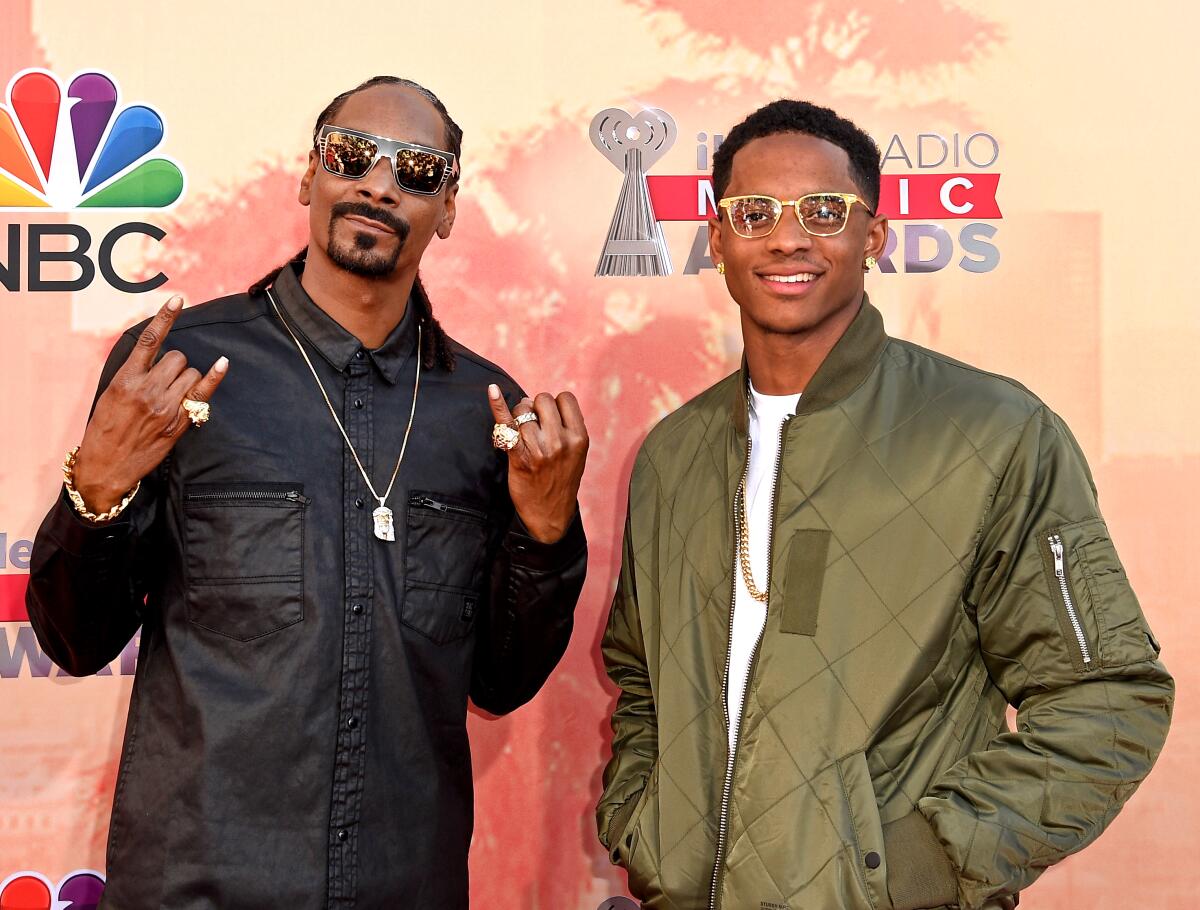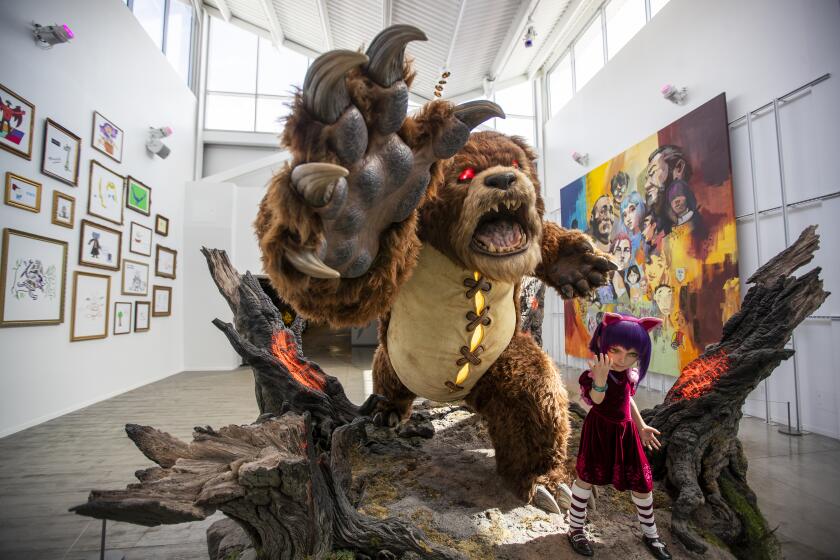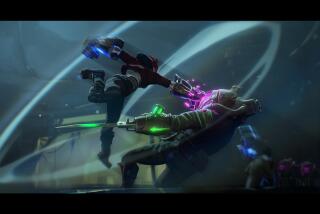Why Snoop Dogg and his son are launching Death Row Games: ‘You gotta have representation’

- Share via
California’s robust video game scene is about to have another company added to its roster, this time from Snoop Dogg and his son, Cordell Broadus.
The company, Death Row Games, aims to help diverse creators publish content on Epic Games’ online game “Fortnite” via its Fortnite Creative tool set and the editing app Unreal Editor for Fortnite. The company, Broadus said, will likely be based in Los Angeles.
The game’s Creator Economy 2.0 allows for engagement payouts, a way for eligible island creators to receive money based on engagement with their published island content.
Epic builds and sells “Fortnite” cosmetics, often working with third-party IP owners to bring their work into the game. In March, Epic started to reserve 40% of that revenue to distribute based on the engagement created by eligible publishers’ work.
The move marks Snoop’s latest foray into the gaming world, where he’s grown a following as a streamer and collaborated with titles like “Call of Duty” to appear in games.
Snoop, who purchased infamous gangsta rap brand Death Row Records in 2022, was also a member of the esports group FaZe Clan’s board of directors until earlier this year.
Over his decades-long career, the legendary rapper has turned into a multi-hyphenated mogul who has marketed products ranging from Hot Pockets to T-Mobile, launched a successful mobile app and turned his lifelong affinity for cannabis into an empire.
“Myself and my father, we’re avid gamers,” Broadus, 26, said. “We’ve witnessed the power of video games and how impactful storytelling is, and we just wanted to provide an immersive experience that represents the neighborhoods and the places that we come up from.”
Broadus spoke to The Times about the new venture — and the role Death Row Games can play in creating opportunity for diverse creators — for an interview that has been edited for length and clarity.
The global games market will generate $187.7 billion in 2023, up nearly 3 % from last year, a new report from Newzoo projects.
Why launch a game company now?
It’s about creating a platform for under-served creators to feel like they’re a part of the narrative, and also financially be a part of the narrative. Which is why we wanted to focus on building in “Fortnite” first, because they’re doing revenue share with their creators in their Fortnite Creators world. That was so appealing to us.
We’re big on ownership. And for the first time, a giant gaming company is allowing creators to get a piece of the pie. We just wanted to show our alliances with what [Epic Games Chief Executive] Tim Sweeney is doing and see how we could bring unique users — and bring the culture — to this space.
The beauty of us creating in the Fortnite Creators world is it’s extremely cost effective. You can build a game in a matter of months with as little as $100,000 — and that’s never been the case in gaming. It takes years and it takes millions of dollars.
For us to be representative in this space is cool, but for us to also have a piece of the pie is even better, because now we’re creating generational wealth for the next generation to come. And we don’t have to have young kids feel marginalized and only picking a few things to become when they get older.
Why “Fortnite” specifically?
“Fortnite” got all the kids. Tim Sweeney is a visionary, somebody I’ve been following for a long time as well. What he was able to do with “Fortnite” to make it so accessible, it’s a free game. My nephews and my little cousins, they’ve spent thousands of dollars on my uncles’ and aunties’ credit cards. To see how a free game can make you that passionate, to want to be more immersed and just be a gamer — a full-fledged gamer — to see the careers it’s created for guys like Ninja and all these huge streamers, it’s a healthy ecosystem.
There’s a lot of games out there that are kind of, you know, raunchy and extremely violent, and this game is kid-friendly. It’s teen-friendly. It’s family-friendly. It just spoke to me. When I moved to San Diego, I started playing “Fortnite” every day. I understand why people love this game so much. I understand the future of it.
That’s the real Metaverse, it’s 400 million people playing that game. Friendships are being made. So many relationships are being created. And now there’s a rev share model in the creators world. That was just game-changing to me. Like why would this game that makes all this money be willing to share some of the revenue? That right there was just enough for me to say I’m all the way in, how can we work with you?
The opportunity presented itself and we definitely took advantage of it.
Developed by California-based Sledgehammer Games, “Call of Duty: Modern Warfare 3” required intensive costume preparation to bring military outfits to the screen.
How will your company be supporting these creators?
Just think about it like this: If there’s a creator who loves to fish — say this influencer goes fishing and has all this content around animals — we will bring that content creator and pair them with a studio within the Fortnite Creators world and we will help bridge the two different worlds and create that game. So that’s authentic to that influencer’s audience and it’s authentic to what the “Fortnite” ecosystem is used to.
And then also, we want to try to bring unique users into the space. A lot of the 18-to-25-year-olds are probably not playing “Fortnite” and we want to change that demographic. A lot of kids from the inner cities are probably not playing “Fortnite,” we want to change that and bring unique users and show that there’s a rev share model within his game. And instead of just consuming, you can monetize and build a brand and build an IP that you can incubate at a reasonable price within a reasonable time frame. So this just seems a bit more you know, realistic for the average creator.
So you want to bring these revenue streams specifically to diverse kids?
I don’t care where they’re from — if they look like us and they’re minorities, that’s what we want to bring to this space. The hip-hop guys, the athletes, the fashion. Anybody from the culture and that represents the culture, we want to help them create games within the “Fortnite” creators world if they’re interested.
What has it been like to work with your dad and launch a game company together?
I was a kid watching my dad play “Madden” and watching all his hip-hop friends come over and just seeing the excitement of grown men playing video games like they’re kids, and to see how powerful and how influential these figures are. You know, in hip hop culture, if they say something is cool, it’s cool. It’s always been an intersection with hip hop and gaming and you know, we just want to really solidify our stake in the ecosystem.
This was honestly my dream as a kid, but I never knew exactly what route to take.
In 2018, with couple friends of mine, we made a sizzle for a game. It was like a fighting game. Snoop was a character, as well as all of his peers. And I remember showing it to him and he was like, “It’s gonna be hard for you to make that game. People that look like you don’t really make games at all.” I remember really wanting to take that challenge on.
We’re growing this slowly. We want to utilize our resources and connect the bridge between not just hip-hop but all of culture, sports, fashion, and help them segue into the gaming space like we’ve done in so many other sectors. Whether it’s consumer product goods, whether it’s film and television, my father has always been the bridge to helping people expand their IPs, even though he hasn’t been extremely vocal about it. He’s been the source to help people diversify their brand and help monetize in ways that they didn’t think that they could.
You mentioned your love for games. What made you want to launch this particular venture?
I think just being a kid and playing “Grand Theft Auto: San Andreas” and knowing my uncle was one of the main creators in that game, DJ Pooh. I remember just seeing all my peers, everybody in inner cities fall in love with that game. And just me knowing, ‘Oh, uncle Pooh made that, so I could do that.’ It was just like, in a sense reachable. Most dreams, you gotta have representation, someone that looked like yourself so you could feel like you could do it. And that was my validation, seeing how successful DJ Pooh was in the gaming industry.
And then it just always seemed like EA Sports and Microsoft were coming down to my dad’s house and giving him games early before they came out. And just seeing how he consumed is so much I was always just like, a business kid thinking like, ‘How can I do this myself? How can I sell the game?’ I had no avenue to take — I was stuck in the sports world. I played football from age 6 to 18 and was recruited from all the Division 1 colleges. I jumped out on a leap of faith and, you know, betting on myself and took the entrepreneurial route.
What games inspired you growing up?
“Fusion Frenzy” because I used to play with my sister, my brother and all her friends and it was like four players could play at once. Each player had a different color and it was just so fun.
And then, just being a spectator too. I didn’t play every game. My brother was the real gamer. He was playing “World of Warcraft,” “Rock Band.” He was playing all those games for so many hours, and I was just seeing him just be consumed by these games and it was just so attractive to me. I wasn’t a gamer growing up.
When I was a young kid, my grandma played “Zelda” all the time. My grandma is a gamer. I need to actually drop off this new PlayStation to her. She is one of the hugest gamers that I know to this day.
More to Read
Inside the business of entertainment
The Wide Shot brings you news, analysis and insights on everything from streaming wars to production — and what it all means for the future.
You may occasionally receive promotional content from the Los Angeles Times.













